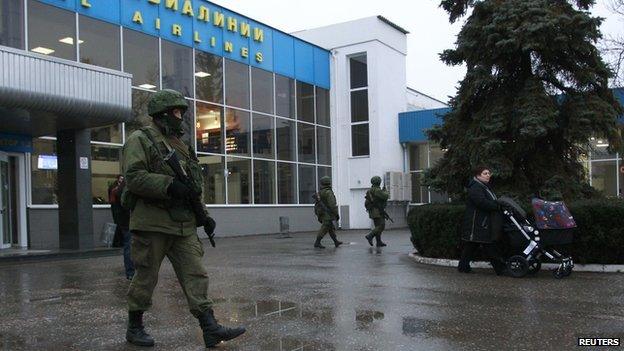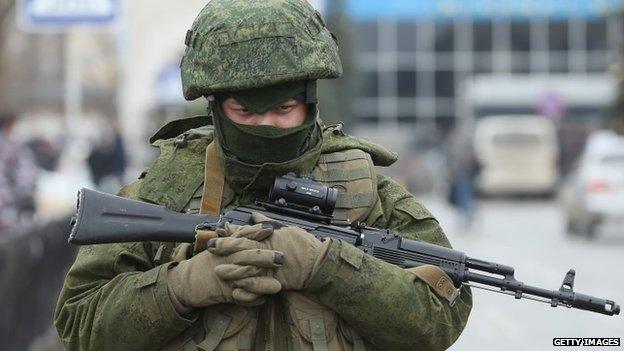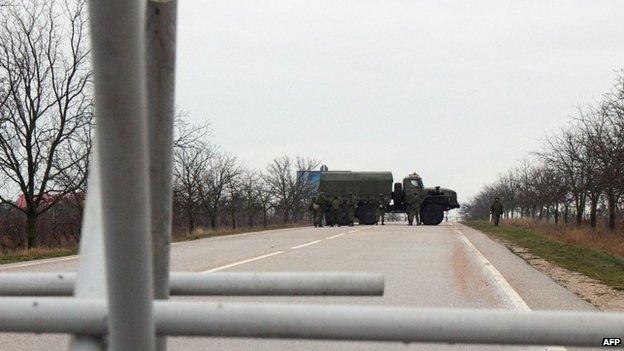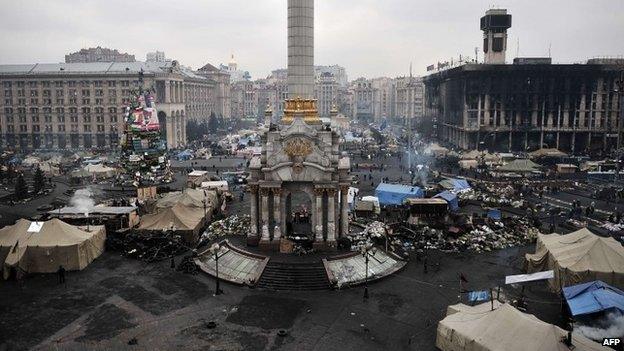Ukrainian ex-leader Viktor Yanukovych vows fightback
- Published
Key moments from Viktor Yanukovych's news conference
Viktor Yanukovych has vowed to fight for Ukraine, in his first public appearance since being ousted as president last week.
Speaking in Russia, he said he was "not overthrown" but was compelled to leave Ukraine after threats to his life.
In the latest flare-up, Ukraine accused Russian troops of seizing two airports in Crimea - charges denied by Moscow.
Russian President Vladimir Putin has called for a rapid return to normality in Ukraine.
Mr Putin spoke to Western leaders to emphasise "the extreme importance of not allowing a further escalation of violence", the Kremlin said.
However, Ukraine's foreign ministry has sent a protest note to Moscow citing a violation of airspace and provisions of the treaty regulating the Russian presence in Crimea.
The note does not give details, but follows unconfirmed reports of Russian planes landing at Simferopol - allegedly with hundreds of Russian troops on board.
In other developments:
Swiss and Austrian authorities block the assets of Viktor Yanukovych and his associates, and launch a corruption probe
Russian MPs propose new laws that would make it easier for Russia to incorporate parts of Ukraine
Amid fears of hyperinflation, Ukraine's central bank has put a 15,000 hryvnia (1,000 euro; £820) limit on daily cash withdrawals
The UN Security Council is set to hold private discussions on the crisis later on Friday
'Bandit coup'
"I intend to continue to struggle for the future of Ukraine, against terror and fear," Mr Yanukovych told the news conference in the southern Russian city of Rostov-on-Don.
"What's going on now is lawlessness, lack of authority, and terror. Decisions in parliament were taken under duress."
He apologised to the Ukrainian people for not having "enough strength to keep stability" and described his usurpers as "young, neo-fascists".
He insisted he did not "flee anywhere", explaining that his car was shot at as he left Kiev and he was forced to move around Ukraine amid fears for the safety of himself and his family.
He said he arrived in Russia "thanks to a patriotically-minded young officer" and was given refuge in Rostov by an old friend.
Speaking in Russian, Mr Yanukovych said he would return to Ukraine "as soon as there are guarantees for my security and that of my family".
But he ruled out taking part in elections planned for 25 May, describing them as "illegal".
Later Ukrainian authorities said they had started moves to have him extradited to Kiev where he is wanted on charges of mass murder.
Christian Fraser says barriers and armed men are blocking Sevastopol airport
And he said the only way out of the crisis is to implement an EU-backed compromise agreement he signed with opposition leaders last week before he was deposed.
The current turmoil in Crimea was "an absolutely natural reaction to the bandit coup that occurred in Kiev", he said, adding that he was surprised by the restraint shown by Russian President Vladimir Putin so far.
But he stressed that "military action in this situation is unacceptable" and said he wanted Crimea to remain part of Ukraine.
'Armed invasion'
Armed men took over Sevastopol and Simferopol airports in the early hours of Friday.
Acting national security chief Andriy Parubiy said the airports were back in the control of the Ukrainian authorities, but the men were now manning checkpoints on the surrounding roads.


Armed men carrying Russian navy flags arrived at Simferopol airport in several trucks

They have declined to say who they are, and are wearing no identifying insignia

Men whom Ukraine says are Russian naval troops have also blocked roads to Sevastopol airport

Meanwhile people are still reeling from the violence in Kiev, which led to the ousting of Mr Yanukovych.
Witnesses also reported seeing Russian army trucks and helicopters in and around the regional capital Simferopol and Sevastopol, where Russia's Black Sea Fleet is based.
The move on the airports prompted Ukrainian Interior Minister Arsen Avakov to accuse Russia of carrying out an "armed invasion" of Crimea.
Russia denied any involvement with the takeover at the airport, but confirmed its armoured vehicles had been on the move around Crimea for "security" reasons.
On Thursday, a group of unidentified armed men entered Crimea's parliament building by force, and hoisted a Russian flag on the roof.
They were still in the building when the Crimean parliament later announced it would hold a referendum on expanding the region's autonomy from Ukraine on 25 May.
Crimea is becoming the lynchpin of a struggle between Ukraine's new leaders and those loyal to Russia, the BBC's diplomatic correspondent Bridget Kendall says.
The majority of people in Crimea are ethnic Russians, but ethnic Ukrainians loyal to Kiev and Muslim Tatars - whose animosity towards Russia stretches back to Stalin's deportations during World War Two - have formed an alliance to oppose any move back towards Moscow.